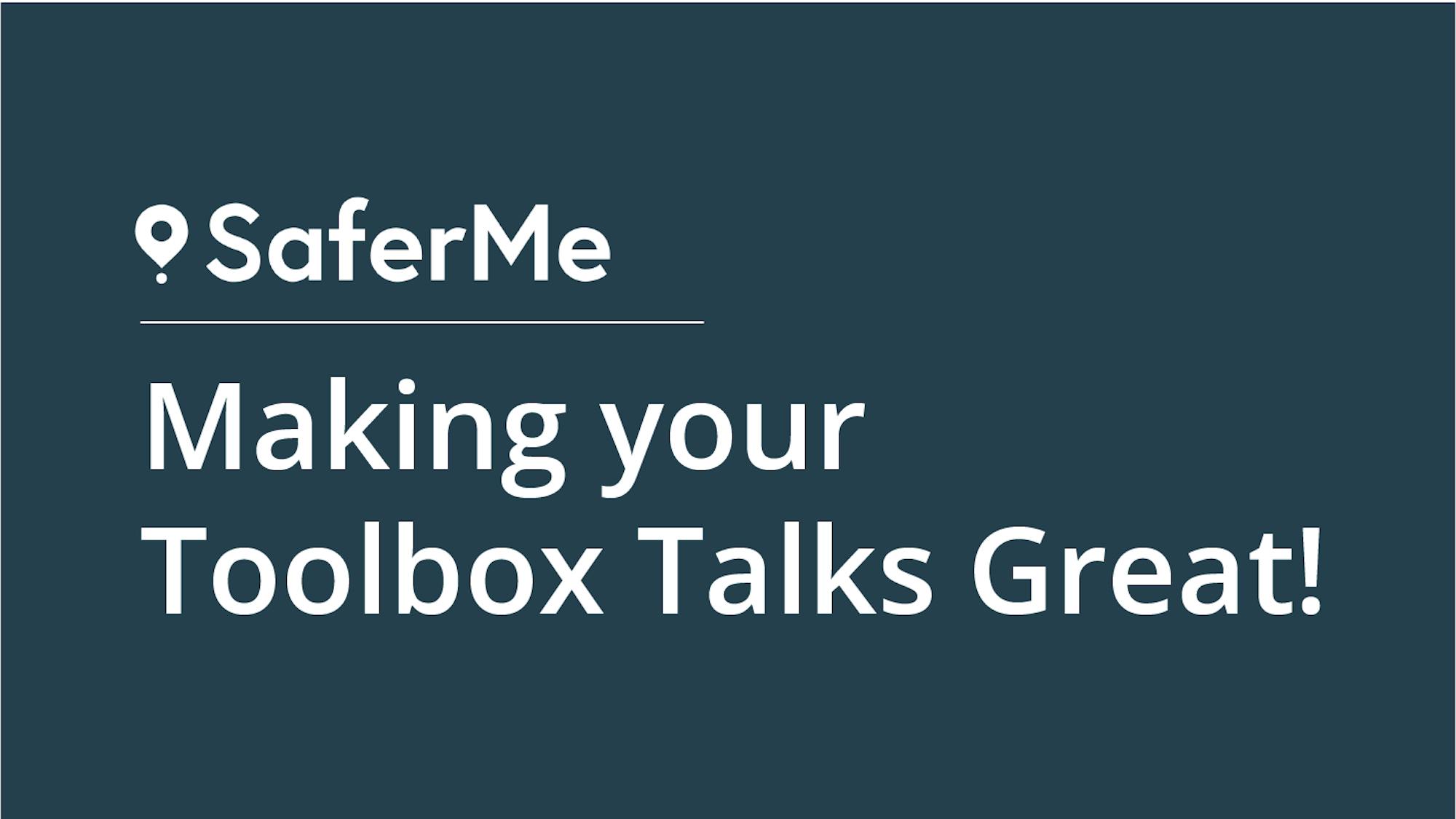
What is a Toolbox Talk?
Toolbox talks are a short, informal group discussion. They are a way to ensure all workers are aware of specific safety hazards and safe work practices.
It also gives everyone an opportunity to discuss any hazards/controls, incidents or accidents that may have happened in the work environment.
Ideally, toolbox talks should be run daily and should be part of your workplace routine. Each talk should cover a new toolbox talk topic, including a quick discussion on the topic, highlighting any information that is specific to your workplace.
Here are 101 Toolbox Talk examples for you to check out. PS. We also sell Toolbox Talk Cards!
What makes a good toolbox talk?
Be Relevant
Make sure you're talking with your team about topics that make sense to the site, people and type of work that you’re doing.
There’s no point delivering a talk on Office Desk Ergonomics if all of your workers are based out on the field. It’s much better to take a relevant topic that relates to your team's work at that time, this will keep them engaged and interested in what is being discussed.
Our Toolbox Talk Card Packs come with 4 different themes, to help you choose relevant topics for your team.
Ask questions
Rather than making your toolbox talk meetings a lecture with no team discussions, try asking questions to promote involvement.
Getting your team involved not only makes everyone an important part of the safety process but it can also help in identifying potential hazards or accidents that may have not yet been reported.
Check out the ‘Chat Time’ section on our Toolbox Talk Cards, here we offer 3 different questions and talking points relating to each of our Toolbox topics.
Engaging delivery
Traditionally, Toolbox Talks are delivered face to face with one person (usually your health and safety manager) giving the talk, and the rest of the team listening in.
If someone can’t make it to the Toolbox Talk, having a handout or digital copy available for them is a good way to make sure everyone is kept up to date with your safety processes.
Each of our Toolbox Talk Cards come with an online version on the topic, send your team the related link or they can be downloaded and printed.
Demonstrations are a great way to keep everyone engaged in the topic and will help your team retain the information.
For example if you are giving a Toolbox Talk on Personal Protective Equipment (PPE), have all the PPE that the team should be wearing with you and demonstrate what and how it should be worn.
Record meeting notes
Keeping meeting minutes is a great way to ensure topics aren’t being missed or repeated.
They can help you keep track of who was in attendance at each talk, and help you bridge any knowledge gaps within your team.
It is also a good opportunity to write down any unanswered questions or comments brought up by your team so they are not forgotten and to ensure that the right actions are taken.
Keeping records can be as easy as jotting down who was there and what topic was covered in a notepad, or you can have a Toolbox Talk Form that is filled in during and/or after each meeting.
Toolbox Talk Examples
Wondering how you will come up with new and engaging toolbox talk topics? We have you covered.
Below is our list of 101 Toolbox Talk Topics for your business.
Want to see more detailed toolbox talk topic ideas? Check out our toolbox talk topic generator.
Or check out our Toolbox Talk Card Packs for inspiration and guidance for your daily toolbox talks. Each pack contains 50 Toolbox Talk Cards with talking points, sample questions to ask your team and a QR code that takes you to more details on each topic.
Toolbox Talk Examples:
- Evacuation procedures
- Excavation
- Eye Strain
- Eye protection
- Fall protection Anchor Systems
- Fatigue Management
- Fire Extinguishers
- Fire prevention
- First Aid
- Footwear
- Forklifts
- Frostbite
- Gas Safety
- Guard Rails
- Hand Tool Safety
- Hand protection
- Hazard Assessment
- Head Protection
- Hearing protection
- Hoisting Signals
- Home office egonomics
- Housekeeping
- Hydrogen Sulfide
- Inert Gasses
- Ladder safety
- Lead
- Leg safety
- Legionella
- Lighting Conditions
- Lone Working
- Method Statement
- Mind on safety
- Mold and Mildew
- Near misses
- Noise exposure
- Permits To Work
- Personal Care and Conduct
- Personal Protective Equipment (PPE)
- Power Line Safety
- Presenteeism
- Protecting the Public
- Rebar and Impalement Hazards
- Refueling
- Respiratory Protection
- Rights and responsibilities
- Risk Assessment
- Roof Work
- Safe Use of Power Tools
- Safety Culture
- Safety Nets
- Safety Signs
- Scaffold Safety
- Sharp objects
- Silica Dust Exposure
- Site Access and Egress
- Skip Loaders
- Slips, Trips, and Falls
- Social Distancing
- Stress
- Stretching
- Summer Weather Hazards
- Temporary Heating
- Temporary Stairs and Handrails
- Traffic control
- Trailer Towing
- Tyre Safety
- Underground Utilities
- Welder’s Flash
- Winter Site Safety
- Work refusal
- Working from home
- Workplace Complacency
- Youth in Construction
- Zero harm
Subscribe below to get future posts from SaferMe
We send out emails once a month. We won't share your email with anyone.